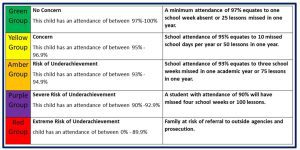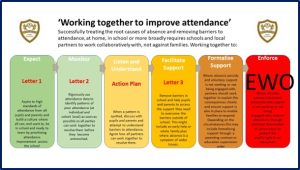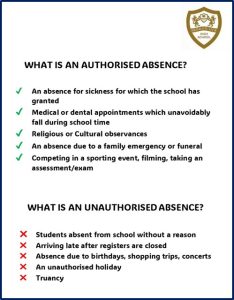To download an absence request form click here
Please return the form to e.lamb@bridgewaterhigh.com
Welcome

Mr D Morrison
Assistant Headteacher
d.morrison@bridgewaterhigh.com
As the school’s attendance champion, it is my job to ensure that all pupils attend school, and it is a job that I take very seriously. However we, as a school, recognise that enhancing school attendance is a collective effort, requiring collaboration from all stakeholders. The well-established connection between attendance and academic achievement underscores its significance. Irregular attendance adversely affects students’ academic performance, mental well-being, and resilience. When students miss sporadic days (or longer periods) of school, they miss crucial building blocks of knowledge.
Our commitment to promoting good attendance involves continuous monitoring by staff, communication with parents, and proactive measures to prevent further absences. Our goal for all students is 100% attendance and punctuality, with a minimum expectation of 97% throughout the academic year.
Parents have a legal obligation to send their children to school, but there’s a risk that students get caught in a cycle of absence and therefore may struggle to catch up. We are diligently addressing attendance challenges arising from the pandemic. The government’s national campaign emphasises the value of each school day and encourages positive communication between parents, carers, and the school.
To empower parents, we provide accessible online resources and guidance. Our staff are always available to assist students in catching up or understanding missed material. The ‘attendance triangle’ illustrates when attendance becomes problematic and outlines the support available to students facing ongoing absences.

Attendance Booklet
Please click on the link below to read our no-nonsense guide to attendance for parents and carers.~

Please click here for the Attendance Booklet
Pupil Presentation

Please click here for Attendance Assembly Presentation
Reporting Absence
Ensure your child attends every day, on time, equipped and ready to learn. Lesson time begins at 8.40am and students should be in the building by 8.37am. Students arriving after 8.40am will be marked late and will be given a late detention regardless of reason.
Ensure the school has up-to-date addresses and telephone numbers. We will contact you if your child is absent and you have not contacted the office. This ensures that the absence is quickly identified.
If your child is ill, contact school on the first day of absence. If no contact is received regarding the absence, it is recorded as un-authorised.
Ensure that medical appointments are made outside of the school day where possible.
Avoid trivial absences such as, ‘buying new shoes’ or ‘birthday celebrations’. This would not be accepted as a reasonable absence.
Holidays should not be taken in school time. Any Leave of Absence can only be agreed by the Headteacher and only agreed where there are exceptional circumstances.
Respond to letters or telephone calls regarding attendance and punctuality.
Contact your child’s Head of Year as soon as possible if you are having difficulty getting your child into school.
Lates
Parents need to be aware that a pupil who is late to school after 9.10am will lose their attendance for that session. The DFE states that;
‘All schools are expected to set out in their attendance policy the length of time the register will be open, after which a pupil will be marked as absent. This should be the same for every session and not longer than 30 minutes.’
This means that if your child arrives after 9.10am to school they will be marked as late after the register is closed and this will affect their overall attendance.

Persistent Absence
Persistent Absence is attendance below 90% at the end of an academic year. This equates to 19 days of school missed. As adults we know that 19 days of absence from your place of work would have implications going forward for employees. At Bridgewater High School we want all our pupils by Y11 to be workplace ready. Therefore, throughout the school year we monitor persistent absence as this is the best indicator as to which students will have absence concerns.
Government statistics have shown that since the pandemic and the prevalence of Covid-19, attendance, and parental views on absence from school have changed and is likely to have had a damaging effect on pupil attendance to school. This, in real terms, means that parents are more likely to book term time holidays and keep children off school, when previously they would have sent them in with minor bugs or illness.
The DFE data on attendance confirms this. In the summer term in England and Wales – the most recent period for which data is available – 23.5% of all pupils were persistently absent (defined as missing 10% or more of sessions) and 1.4% were severely absent (meaning they missed at least 50% of sessions).
In the 2018/19 academic year, the figures for persistent and severe absence were 10.9% and 0.8% respectively.
In response to this, the DFE is asking school to actively intervene with families whose young people are absent for more than 10% (an attendance figure of less than 90%.) This is persistent absence.
In school we are aware that children become poorly and from time to time will be understandably absent from school. However, over a school year, attendance – for the vast majority of students—should not fall below 97%. This equates to around 6 days of absence. If attendances falls below 97%, a supportive process will be implemented as follows;
Attendance falls below 97% – Attendance letter 1 is issued. This is automatic and is vital in informing parents of the drop in attendance.
Attendance continues to fall and is now below 93% – Attendance letter 2 is issued. This will ensure that the school and home agree an action plan to improve.
Attendance continues to fall and is now below 90%. Attendance letter 3 is issued and a meeting is held at the school to discuss how improvements can be made to ensure good attendance. Should parents fail to engage with the school (and outside agencies) to improve attendance then the school will need to refer to the Educational Welfare Officer (EWO) at the local authority to ensure that school attendance improves.

How can we improve attendance together?
The DFE, in its latest guidance to parents and schools, is urging all partners to work together to improve the attendance of pupils. This challenge is not the responsibility of parents or schools alone. But together in partnership.
Schools need to accept that all parents want their children to attend school, however sometimes barriers exist outside of the control of parents or carers.
Parents need to accept that schools have a legal requirement to ensure that pupils attend school regularly and that unnecessary days away from school should be avoided.
Outlined below are the most common barriers to school attendance and the support the school can offer. If you have any concerns about your son or daughters’ attendance, contact the school immediately on enquiries@bridgewaterhigh.com

Absence from school is either authorised by the school, or unauthorised. The school has very strict guidance on what absence can and cannot be approved from the Department for Education (DFE).
See below:

Legal Requirements
Parents whose children are registered at a school or other educational establishment are then responsible for ensuring that they attend punctually, regularly, stay there as required and follow the school’s rules with regard to behaviour. If parent/ carer(s) fail to ensure this, there are a number of options open to the Local Authority and schools to secure an improvement in the child’s behaviour and attendance and support parents to achieve this.
A parent’s failure to ensure the regular attendance of their child at school is a criminal offence. The LA has the power to prosecute for this offence in the Magistrates’ Courts under s444 (1) Level 3 offence or (1A) Level 4 offence of the Education Act 1996. On conviction, parents can be fined up to £1000 (1) or in the case of an “aggravated” offence (1A) they can be fined up to £2500 and may also be liable to a custodial sentence of up to 3 months or a Community Order.
If a parent fails to ensure their child’s regular attendance at an alternative provision the LA also has the power to prosecute them in the Magistrates’ Courts. In this case the parent must first have been given notice in writing of the requirement of their child to attend the alternative provision.
